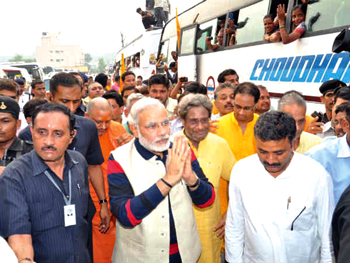India won’t go topsy turvy in elections next year, just as the world didn’t in 2000 due to the Y2K syndrome

vickynanjapa.wordpress.com
DISASTER TOURISM: Narendra Modi is accused of milking the tragedy in Uttarakhand for political benefit.
The Indian media’s obsession with
Narendra Modi ahead of elections next year threatens to turn him into the political equivalent of what was called the
Y2K challenge, the magnitude of which eventually turned out to be overblown.
On 1 January 2000, computer glitches were widely expected to have planes falling off the skies, disrupting public utilities, and even freezing elevators. None of this happened.
In 2013, Modi has spawned similar passions, fears, and analyses reminiscent of the countdown to the end of 1999. Modi’s supporters believe his charisma can sweep aside class, caste, regional, linguistic, even religious, divides to enable the BJP-led NDA to sweep out the UPA from power. His opponents perceive his rise portends the end of the idea of India.
The responses of both his supporters and opponents betray the Y2K syndrome, which had stemmed from a seemingly sound assumption: since digital memory was designed to store years in double-digit –1999 as 99, 1998 as 98, and so on –it was assumed that at the turn of the millennium, the computer would recognise the year 2000 as 00 or 1900 and, therefore, go haywire.
Similarly, it is made to appear that Modi’s much-vaunted charisma would neutralise identity politics and inspire the voter to behave in unforeseeable ways, just as computers afflicted with the Y2K bug were feared would.
No doubt, BJP cadre and the middle class find Modi mesmerising. But they are just a subset of the Indian electorate. The BJP hasn’t even acquired a critical mass in, say, Kerala, Tamil Nadu, or Andhra Pradesh, for it to gain from the advantage Modi-led election campaign is expected to spawn. In the recent Karnataka assembly election, he articulated the Hindutva ideology during his campaign in Mangalore, yet the city elected Congress candidates, two Muslims and a Christian.
More significantly, every social group perceives its leader most charismatic. For instance, Mayawati is to the Dalits of Uttar Pradesh what Modi is to a section of the middle class. It’s unlikely he can wean away the Dalits from her. Further, charisma is just one of the many factors voters take into account at the time of casting their ballot.
Modi’s supporters say his appeal is based on his proven record of governance. It is the reason, they say, the corporate world loves him, and the pink papers portray him as the leader who can treat the economy. Not to support Modi is depicted as voting for economic stagnation. Don’t forget, in 1999 too, software experts fanned the Y2K fear to bag lucrative contracts. In Modi, the middle class see a leader who can preserve and promote their interests.
Modi’s supporters know his appointment as the BJP’s campaign chief will have his opponents harp on the dangers he poses to secularism. This could polarise the voters and help him garner the ‘Hindu vote’, in much the same way as our fear of a chaotic world helped balloon the profits of software firms in 1999.
The BJP believes Modi has it in him to enable it to win seats close to a majority-mark, thereby rendering redundant the need to win support of several allies. This was why the objection of Bihar Chief Minister Nitish Kumar, who was till recently the BJP’s principal ally, to Modi’s appointment was swept aside. The veracity of their belief can be checked only through the 2014 election. You can’t but sit out the next 12 months to get proof of Modi’s vote-catching ability countrywide.
It gives time to Modi’s opponents to bolster their forces, it also opens the possibility of Modi making mistakes. For instance, his intervention in the rescue operations after the floods in Uttarakhand last week hasn’t been as effective as his spin doctors tried to project. Some have accused him of milking the tragedy for political benefit.
[email protected]
Other columns by Ajaz Ashraf:
India’s gender insurrection
No moral high ground
Suicide burner